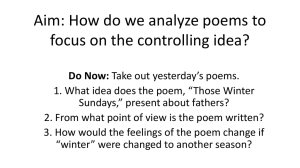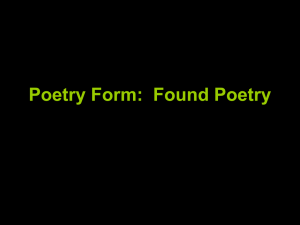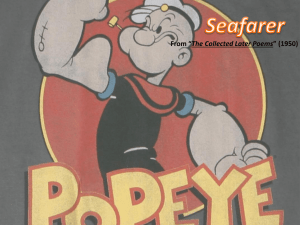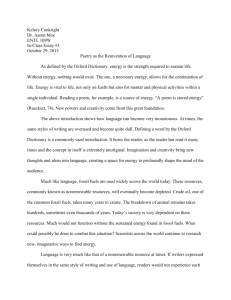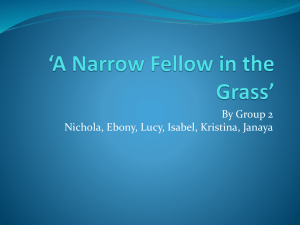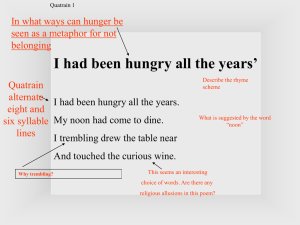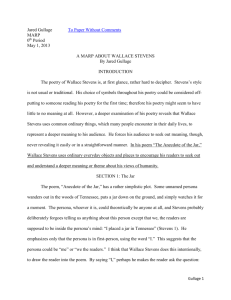What mystery pervades a well! PRESO
advertisement
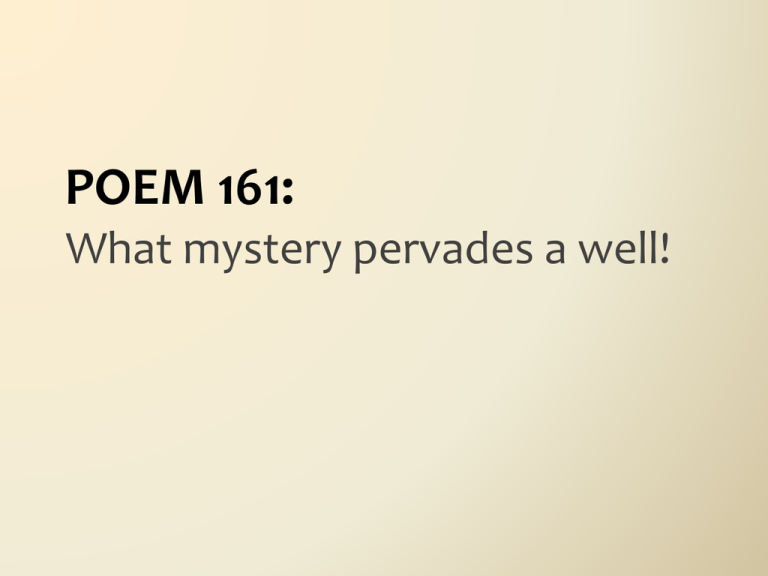
POEM 161: What mystery pervades a well! What mystery pervades a well! The water lives so far – A neighbour from another world Residing in a jar Whose limit none have ever seen, But just his lid of glass, Like looking every time you please In an abyss’s face The grass does not appear afraid. I often wonder he Can stand so close and look so bold At what is awe to me. Related somehow they may be; The sedge stands next the sea Where he is floorless And does no timidity betray But nature is a stranger yet; The ones that cite her most Have never passed her haunted house Nor simplified her ghost. To pity those that know her not Is helped by the regret That those who know her less The nearer her they get CONTENT OVERVIEW This poem acts as a meditation on the persona’s alienation from nature and not belonging to its world, although she closely and appreciatively describes it. the poem follows a progression of mysteries, the well to the sea and then to nature, exploring how the closer one gets to nature and understanding it, the more questions are raised and instead of taking one step forward, two steps have been taken back. STRUCTURE This poem is structured in four stanza’s each having four lines. There is not a particular rhyming scheme or rhythm, instead, Dickinson uses slant rhyme. What mystery pervades a well! The water lives so far – A neighbour from another world Residing in a jar LANGUAGE TECHNIQUES » ‘But Nature is a stranger yet’ - personifies nature, shows how important it is to her. But that its a stranger so she desires to belong to it but is unable to. » ‘The grass does not appear afraid.’ - Making nature seem brave and to show it belongs next the well » ‘The water lives so far – A neighbour from another world residing in a jar’ – water has connotations such that imply cleansing both physical and spiritual as well as nature and life. In this sentence Dickinson compares the work of man ‘the jar’ and the majesty, depth and complexity of nature. This shows her undertsanding and connection with nature. » ‘Like looking every time you please in an abyss’s face’ – this explores the idea through personification again the idea of nature’s power and how human creations cannot compare. » Personifying nature is this way shows the persona deep connection to nature and their emotions of ‘awe’ at the expanse and power of the sea ‘where he is floorless’. » Paradox: "That those who know her know her less the nearer her they get“ - Once you get slightly closer to belonging to nature, you belong less. One step forward two steps back. » Alliteration: "The sedge stands next the sea" SIGNIFICANT QUOTES “But nature is a stranger yet” “never passed her haunted house” “those who know her know her less” “residing in a jar” and “neighbour from another world” KEY IDEAS OF BELONGING In the poem 161 the idea of wanting to belong to nature is evident, as in many of her poems. Although paradoxically the persona is in awe of nature and simultaneously is afraid and somewhat timid to the idea of belonging. In the poem, Dickinson has emphasized that the closer one gets to nature and belonging to it they learn how truly alien ‘she’ is by focusing closely on her; nature, and realizing paradoxically ‘that those who know her, know her less, the nearer to her they get.’ LINKS TO OTHER POEMS The main connection between this poem and the other poems written by Dickinson is the common theme of nature. As demonstrated in poems ‘82’ and ‘66’ the connection is evident between nature and herself. Within these three poems she repeatedly makes a reference to nature such as ‘world’, ‘nature’ and ‘countrymen’ in poem 66, ‘mountain bush’, ‘birds’ and ‘nature’s dining room’ in 82 and finally in 161 she mentions ‘world’, ‘abyss’ and ‘sea’. In these three poems she shows feelings of alienation, out of place and dislocation through her interrupted rhyming structure and lack of flow. OPINION ON THE POEM As a group we at first struggled to understand the poem and how it related to the concept of belonging. Through the readings and research of this poem we eventually came to the conclusion that the persona within the poem longs to belong with nature but struggles to fully understand its complexities and depth and majesty of its power. This is achieved through Dickinson’s use of comparison between nature and man made objects such as the ‘well’, ‘glass’ and the ‘jar’.




